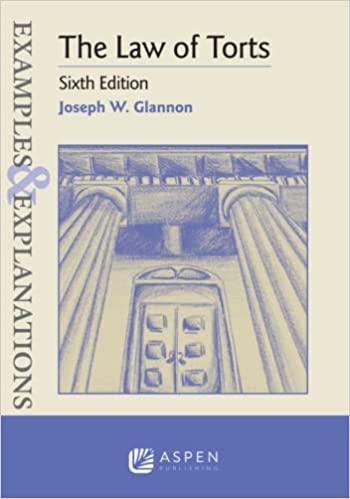Question
True or False 16. Workers have a statutory right to strike over safety issues pursuant to federal law. 17. According to Kelsay v. Motorola, Inc.
True or False
16.Workers have a statutory right to strike over safety issues pursuant to federal law.
17.According toKelsay v. Motorola, Inc., a plaintiff may bring a retaliation claim for asserting her rights under the Workers' Compensation Act where the Act contains no anti-retaliation provision.
18. The Supreme Court has implied anti-retaliation protections for several federal anti-discrimination rights, including Title IX, Section 15 of ADEA, and 42 U.S.C. 1981.
19. InGeary v. United States Steel Corp., the employee was protected from termination for taking his concerns about a product's safety to a vice-president, after being told by his supervisors to "follow directions."
20.InPalmateer v. International Harvester Co., the Supreme Court of Illinois provided a precise definition of the term "public" for purposes of a wrongful termination in violation of public policy claim.
21. InPalmateer v. International Harvester Co., the Supreme Court of Illinois recognized that although there is no precise line of demarcation dividing matters that are the subject of public policies from matters purely personal, a survey of cases in other states involving retaliatory discharges show that a matter must strike at the heart of a citizen's social rights, duties, and responsibilities before the tort will be allowed.
22.An active whistleblower is one forced to choose between his or her job and fulfilling a legal duty or complying with the law.
23. A passive whistleblower is one who opposes or complains about his or her employer's unlawful activity on his or her own initiative.
24.The public employee whistleblower enjoys substantial protection under the First Amendment for disclosures on matters of public interest but not if making of such disclosures is part of the employee's job duties.
25.California provides broad protections to whistleblowers in California Labor Code Section 1102.5.
26. The civil False Claims Act provides a means for whistleblowers (or others) to sue employers (or their agents) who present false or fraudulent claims to the government.
27.Under the civil False Claims Act, the suit is in the nature of aqui tam action on behalf of the government (which has the right to assume primary responsibility for the suit or, with court approval, seek its dismissal).
28. The Sarbanes-Oxley Act of 2002 contains no whistleblower protections.
29. To sue under Dodd-Frank's anti-retaliation provision, a person must first provide information relating to a violation of the securities laws to the Commission.
30. Justice Ginsburg's opinion inDigital Realty Trust v. Somers explains that Sarbanes-Oxley protects individuals who report wrongdoing to the SEC but also to any federal agency, Congress or to an internal supervisor. Dodd-Frank, which provides a bounty program for individuals who report wrongdoing to the SEC where a successful action is brought, defines whistleblower as someone who reports information to the SEC itself.
Step by Step Solution
There are 3 Steps involved in it
Step: 1

Get Instant Access to Expert-Tailored Solutions
See step-by-step solutions with expert insights and AI powered tools for academic success
Step: 2

Step: 3

Ace Your Homework with AI
Get the answers you need in no time with our AI-driven, step-by-step assistance
Get Started


